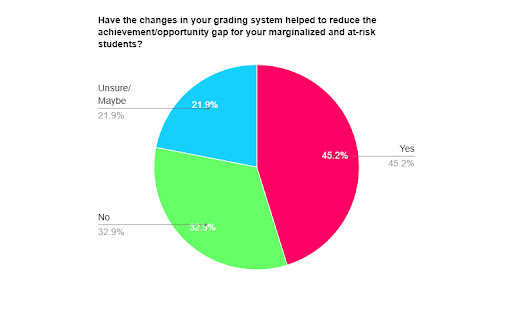Teachers react to Standards-Based Grading
A recent survey of over 80 CVHS teachers shows that staff are divided on what standards-based-grading (SBG) policies to implement and how effective they are.
Almost all of the respondents have implemented some SBG policies but only 45 percent have switched to the 0-4 grading scale. Some SBG policies like 50 percent being the lowest possible grade are only implemented by about 12 percent of respondents, but 63 percent have implemented other policies like not grading non-academic standards such as group work.
“Using ‘no-zero’ grading has created a safety net of sorts for students to pass the class. Fewer students are getting Fs now than before… I’m not sure that fewer Fs, however, is the same thing as more learning or a reduced achievement gap,” wrote an English teacher.
“Students have passed my class who I didn’t feel should pass. Standards Based-Grading allows a person to complete D- work on a few assessments and then pass,” wrote another English teacher.
For assignments, almost all respondents accept late work with parameters/penalties and it is usually less than a quarter of the gradebook. Some teachers find this valuable in its forgiveness for students who do not have the resources to complete homework on time, while others believe homework and the practice of meeting deadlines are crucial lessons.
“The reason that classwork/homework is a significant fraction of the grade is that it is one of the ways that students are actually demonstrating understanding… classwork/homework is an assessment of understanding,” wrote a math teacher.
“I have found that expecting less of students and removing deadlines/consequences reduces student effort. [These methods] generally widen the gap between those who try and those who completely disengage. It feels like we’re setting up our most delicate populations for failure,” wrote a social studies teacher.
For assessments, 93 percent of respondents allow retakes under certain conditions such as completion of required assignments. Many respondents noted that retakes place more responsibility on the student; it ensures that a student tries to understand the material before moving on and they stay motivated to bounce back from a bad grade. Some teachers, however, believe that this is causing students to rely on retakes.
“I firmly believe that a student should come prepared for the assessment on the published date of that assessment,” wrote an English teacher.
Whether or not SBG benefits student learning is almost evenly split among respondents. Some teachers see students taking more responsibility for their learning and succeeding by continuing to try in class and doing what they can in order to understand the material being taught. Others believe that the high forgiveness of SBG is conditioning students to struggle in stricter work environments. Additionally, SBG is argued to be a more equitable grading system, but whether or not it is truly helping at-risk or marginalized students is debated.
“This new system is actually causing issues that were not foreseen. It’s actually negatively affecting higher achieving students and average students. It’s showing no positive impact on poor performers,” wrote a science teacher.
“SBG doesn’t punish slow learners, or students who struggle with homework. It allows students who are absent time to make up and relearn. Students starting with poor grades are able to bring their grade up over time,” wrote a math teacher.
“The kids who don’t want to participate will still not participate,” wrote a PE teacher.
Many teachers believe that SBG needs more polishing before it can be implemented well. How it compares to the A-F grading system, however, is disputed.
“Achievement towards learning goals and skills has improved… typical grading allows kids to skirt by and inflate grades without any achievement towards learning goals (hw cheating, parent help, extra credit….),” wrote a social studies teacher.
“This is setting them up for failure. Colleges don’t let you turn in things late. Colleges don’t let you retake exams as many times as you want. Jobs don’t let you repeatedly turn in work late. Jobs don’t let you redo something multiple times until you get it right,” wrote an English teacher.
“I was very enthusiastic about standards based grading at first, but after trying it for two years there are some elements that aren’t practical… SBG is yet another thing that leaves teachers feeling like they aren’t doing enough when really what is being asked of us would be wonderful in theory but nearly impossible in practice,” wrote a language teacher.
“I can’t wait for this storm to pass. It also does not help that my principal clearly does not understand the difference between standardizing grading and standards-based grading. If they force us to do this for reals, we will need to come up with a standard 4 point scale,” wrote a teacher.
“I did this survey because I was concerned about a disconnect between what was being communicated to the community and what teachers were actually doing… I was also worried about the inconsistency of the implementation of all of these different policies so in order to represent my department on the district grading committee, I wanted to make sure that I understood what teachers were actually doing,” said social studies teacher Jenny Sitkin, who administered the survey to staff.


I feel like standard based grading would be benefitial to students if the teachers had the same mentality towards it. I have some teachers that impliment it, but they all have different grading criteria, and some have 3.2 as an A and some have 3.5 as an A. If the teachers get on the same page, then I think SBG would be a good plus.